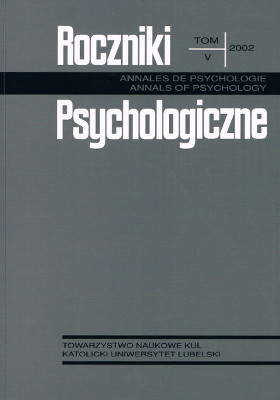Metafora jako sposób ekspresji postaw temporalnych
Abstrakt
The article is devoted to an analysis of temporal metaphors as a way of expressing attitudes towards time. Cognitive functions of this type of metaphors are pointed to, such as: expressing a complex phenomenon of the time in simpler terms, a new and sometimes original view of the time, rendering emotional relation to the time. Different kinds of metaphors are described: Knapp and Garbutt’s as well as Wessman and Ricks's. Finally, results are quoted of selected studies of the relation between preference of temporal metaphors and other psychological variables, among others satisfaction with life and the need of achievement.
Bibliografia
Barker, P. (1997). Metafory w psychoterapii. Gdańsk: GWP.
Boroditsky, L. (1999). Metaphoric structuring, understanding time through spatial metaphors. Cognition, 75, 1-28.
Chlewiński, Z. (1999). Umysł - dynamiczna reprezentacja po jęć . Warszawa: PWN.
Cottle, T. J. (1976). Perceiving time. A psychological investigation with men and women. New York: John Wiley & Sons.
Dobrzyńska, T. (1984). Metafora. Wroclaw: Zakład Narodowy im. Ossolińskich.
Falkiewicz, A. (1996). Istnienie i metafora. Wrocław: Wydawnictwo A.
Fletcher, A. (1965). Allegory. The theory of symbolic mode. New York: Ithaca.
Giosca, V. (1978). Time forms beyond yesterday and tomorrow. New York: An Interface Book.
Gorman, B. S., Wessman, A. E. (1977). Images, values, and concepts of time in psychological research. W: B. S. Gorman, A. E. Wessman (red.), The p e rson al experience of time. New York-London: Plenum Press.
Grossman, J. S., Hallenbeck, Ch. E. (1965). Importance of time and its subjective speed. Perceptual and Motor Skills, 20, 1161-1166.
Hall, E. T. (1976). Ukryty wymiar. Warszawa: PIW.
Hall, E. T. (1987). Bezgłośny język. Warszawa: PIW.
Helman, A. (red.) (1998). Słownik p o jęć filmowych. Wroclaw: Wiedza o Kulturze.
Knapp, R. H., Garbutt, J. T. (1958). Time imagery and the achievement motive. Journal of Personality, 26, 426-434.
Kopaliński, W. (1967). Słownik wyrazów obcych i zwrotów obcojęzycznych. Warszawa: PWN.
Kurz, R. B. (1963). Relationship between time imagery and Rorschach human movement responses. Journal of Consulting Psychology, 27, 3, 273-276.
Lakoff, G., Johnson, M. (1988). Metafory w naszym życiu. Warszawa: PIW.
Lewis, C. S. (1947). Miracles. London-Glasgow: Collins, Fontanna Books.
Łukaszewski, W. (1983). Orientacja temporalna jako jeden z aspektów osobowości. W: W. Łukaszewski (red.), Osobowość - orientacja temporalna - ustosunkowanie do zmian. Wrocław: Wydawnictwo Uniwersytetu Wrocławskiego, s. 5-39.
Łukaszewski, W. (1984). Szanse rozwoju osobowości. Warszawa: Książka i Wiedza.
Mackay, C. K., Brown, W. P. (1970). Metaphor preference vs. semantic ratings as measures of attitude toward time. Journal of General Psychology, 83 (2), 207-212.
Maruszewski, T., Ścigała, E. (1998). Emocje - aleksytymia - poznanie. Poznań: Wydawnictwo Fundacji Humaniora.
Mayenowa, M. R. (1974). Poetyka teoretyczna. Wrocław: Ossolineum.
Meerloo, J. A. M. (1966). The time sense in psychiatry. W: J. T. Fraser (red.), The voices of time. New York: John Day.
Mooij, J. J. A. (1976). A study of metaphor. On the nature of metaphorical expression, with special reference to their reference. Amsterdam-New York-Oxford.
Nałęcka, M. (1997). Zmienne poznawcze a zdolność tworzenia i oceny metafor (praca magisterska, Uniwersytet Wrocławski).
Nęcka, E. (1999). Proces twórczy i je g o ograniczenia. Kraków: Oficyna Wydawnicza „Impuls”.
Nosal, C. S. (1990). Psychologiczne modele umysłu. Warszawa: PWN.
Nosal, C. S. (1993). Style percepcji czasu: wymiary i struktura. Propozycja nowej skali pomiarowej. W: J. Brzeziński (red.), Psychologiczne i psychometryczne problemy diagnostyki psychologicznej. Poznań: Wydawnictwo UAM.
Nosal, C. S. (2000a). Czas jako wymiar regulacji zachowania. Problemy psychologii temporalnej. W: J. Brzeziński, S. Kowalik (red.), O różnych sposobach uprawiania psychologii, s. 106-130.
Nosal, C. S. (2000b). Długa historia czasu. Charaktery, 4, 38-41.
Nosal, C. S. (w druku). Problem umysłowych reprezentacji czasu.
Nosal, C., Bajcar, B. (1999). Czas w umyśle stratega: perspektywa temporalna a wskaźnik zachowań strategicznych. Czasopismo Psychologiczne, 5, 1, 55-68.
Nosal, C., Oleś, P. (1994). Diagnostyczna wartość pomiaru orientacji temporalnych dla wskaźników kryzysu wartościowania. Przegląd Psychologiczny, 37, 4, 525-537.
Pawluczuk, W. (1978). Żywioł i forma. Warszawa: PIW.
Ricoeur, P. (1989). Język, tekst, interpretacja. Warszawa: PIW.
Schulte, G. (1997). An interdyscyplinary p e rsp e ctive on the cognitive meaning of linguistic metaphor its interpretation and computational representation. Philipps-Universität Marburg.
Stępnik, K. (1988). Filozofia metafory. Lublin: Wydawnictwo Lubelskie.
Świątek, J. (1998). W świecie powszechnej metafory językowej. Metafora język owa . Kraków: PAN.
Tisner, K. G., Wahlen, K. (1979). Time perception in adolescent and elderly persons. Zeitschrift für Entwicklungspsychologie und Pedagogische Psychologie, 11, 335-346.
Wallach, M. A., Green, L. R. (1961). On age and the subjestive speed of time. Journal of Gerontology, 16, 71-74.
Wessman, A. E., Ricks, D. F. (1966). Mood and personality. New York: Holt, Rinehart and Winston.
Wróblewski, P. (1998). Struktura, typologia i frekwencja polskich metafor. Białystok: Wydawnictwo Uniwersytetu w Białymstoku.
Zaleski, Z. (1988). Transtemporalne „ja”: osobowość w trzech wymiarach czasowych. Przegląd Psychologiczny, 31, 4, 931-943.
Zdravko, R. (1995). From a metaphorical point of view. A multidisciplinary approach to the cognitive content of m etaphor. Berlin-New York: Walter de Gruyter.
Copyright (c) 2002 Roczniki Psychologiczne

Utwór dostępny jest na licencji Creative Commons Uznanie autorstwa – Użycie niekomercyjne – Bez utworów zależnych 4.0 Międzynarodowe.


